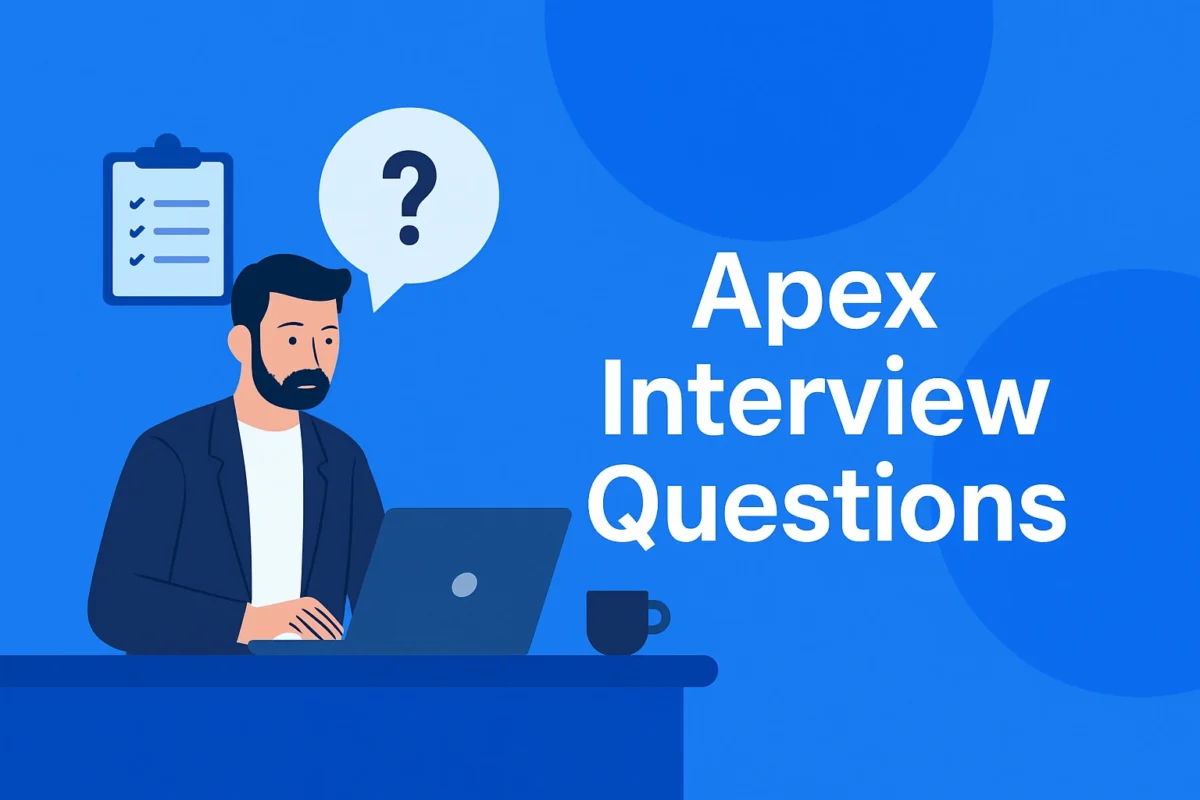
If you’re preparing for a Salesforce development role, mastering Apex Interview Questions is essential. Apex, the proprietary programming language of Salesforce, plays a crucial role in building custom business logic and integrations on the Salesforce platform.
This guide will help you confidently answer the most commonly asked Apex interview questions—from basic to advanced—ensuring you’re fully prepared to impress your interviewer and land your next job.
What is Apex in Salesforce?
Apex is a strongly typed, object-oriented programming language that allows developers to execute flow and transaction control statements on the Salesforce platform server in conjunction with calls to the API. It’s syntactically similar to Java and is primarily used to develop custom business logic, triggers, classes, and integrations within Salesforce.
Why Apex Interview Questions Matter
Hiring managers want to ensure you understand:
-
Apex syntax and best practices
-
Salesforce governor limits
-
Trigger design patterns
-
SOQL/SOSL queries
-
Integration techniques
-
Apex testing and deployment
So let’s explore the most commonly asked Apex interview questions and answers to help you get ahead.
Basic Apex Interview Questions
1. What are Apex triggers?
Answer: Triggers are Apex code that execute before or after insert, update, delete, or undelete operations on Salesforce records. They are used to perform custom actions like validation or calling external APIs when DML events occur.
2. What are different types of Apex Triggers?
-
Before Triggers: Used to validate or modify data before it’s saved to the database.
-
After Triggers: Used when you need to access field values that are set by the system (e.g., record IDs).
3. What are governor limits in Apex?
Answer: Salesforce imposes limits to ensure shared resources are used efficiently. Examples include:
-
Maximum 100 SOQL queries per transaction
-
Maximum 150 DML operations
-
Maximum CPU time of 10,000 ms
These limits prevent bad code from affecting overall system performance.
4. What is the difference between SOQL and SOSL?
| SOQL | SOSL |
|---|---|
| Structured query language for a single object | Search language to search multiple objects |
| Used for precise queries | Used for fuzzy searches across objects |
Intermediate Apex Interview Questions
5. What are Collections in Apex?
Apex supports three types of collections:
-
List: Ordered collection of elements
-
Set: Unordered collection of unique elements
-
Map: Collection of key-value pairs
6. How do you handle exceptions in Apex?
Apex provides a try-catch-finally block for handling exceptions. For example:
7. What is the difference between Database.insert() and insert DML statement?
-
insert: Throws a runtime error and stops execution if one record fails. -
Database.insert: Allows partial success and returns a result object.
Advanced Apex Interview Questions
8. Explain Apex Trigger Best Practices.
-
Use context variables (like
Trigger.isInsert) -
Avoid SOQL and DML in loops
-
Use bulkified logic
-
Delegate logic to Apex classes
-
Write unit tests with good coverage
9. What are future methods and when should you use them?
Future methods are used to run processes asynchronously. They’re ideal when:
-
Making callouts to external services
-
Performing time-consuming logic
-
Avoiding limits in synchronous context
Syntax:
10. How to write test classes in Apex?
Test classes ensure your code is functioning as expected and help meet Salesforce’s 75% code coverage requirement.
Key points:
-
Use
@isTestannotation -
Use
Test.startTest()andTest.stopTest() -
Use
System.assertEquals()for validation
Example:
11. What is a Static Keyword in Apex?
Answer:
The static keyword indicates that a method or variable belongs to the class rather than an instance. It’s useful when:
-
You need a shared variable among all instances
-
You want utility methods that don’t rely on instance variables
Example:
12. What is the Difference Between Triggers and Workflows?
| Feature | Triggers | Workflows |
|---|---|---|
| Type | Code-based | Declarative |
| Flexibility | High | Limited |
| Use Cases | Complex logic, cross objects | Simple field updates, emails |
13. What are Trigger Context Variables in Apex?
Answer:
These are system-defined variables that provide context about trigger execution. Examples include:
-
Trigger.isInsert -
Trigger.isUpdate -
Trigger.new -
Trigger.oldMap
They help determine the type of DML operation and provide access to records.
14. What is a Batch Apex?
Answer:
Batch Apex is used to process large data volumes asynchronously in chunks. It implements Database.Batchable interface and is best for scheduled jobs or processing millions of records.
Structure:
15. What are Apex Test Classes and Why Are They Important?
Answer:
Apex test classes ensure your code is:
-
Working correctly
-
Meeting Salesforce’s 75% code coverage requirement
-
Safe to deploy to production
They simulate DML operations and validate logic using System.assert() statements.
16. Explain the Use of Custom Exceptions in Apex.
Answer:
Custom exceptions allow you to define and throw specific errors for better debugging and error handling.
Example:
17. How Can You Avoid SOQL in Loops?
Best Practice:
Always use bulkified code:
-
Use collections like
List,Map, orSet -
Query once outside the loop
Bad Code:
Good Code:
18. What is the Use of with sharing and without sharing Keywords?
-
with sharing: Enforces the current user’s record-level access. -
without sharing: Ignores sharing rules, allowing full access. -
If omitted, the default is determined by the class calling it.
Example:
19. What Are Limits Class Methods in Apex?
Answer:
The Limits class is used to monitor governor limits during code execution. Examples:
-
Limits.getLimitQueries() -
Limits.getQueries() -
Limits.getDMLRows()
20. How Do You Schedule a Class in Apex?
You can use the Schedulable interface to run Apex code on a schedule.
Example:
To schedule:
Bonus Questions Asked in Real Interviews
-
What is a wrapper class in Apex?
-
How do you call a REST API from Apex?
-
How do you handle callouts in triggers?
-
What is the difference between
public,private,global, andwebServicein Apex?
Tips to Crack Apex Interviews
-
Understand Salesforce architecture and multi-tenant model.
-
Practice writing and debugging Apex code.
-
Be familiar with real-world use cases.
-
Study governor limits thoroughly.
-
Use Trailhead and the Developer Guide for learning.
If you’re also preparing for Salesforce Admin roles, check out our guide on Salesforce Admin Course
FAQ – Apex Interview Questions
Q: Is Apex similar to Java?
Yes, Apex is syntactically similar to Java but is designed to work in Salesforce’s cloud-based environment.
Q: How to avoid hitting governor limits?
Use best practices like bulkification, query optimization, and using asynchronous methods when needed.
Q: How much Apex code coverage is required?
A minimum of 75% coverage is required for deployment to production.
Conclusion
Mastering these Apex Interview Questions will help you succeed in any Salesforce developer interview. Whether you’re a fresher or experienced professional, understanding core concepts, writing optimized code, and preparing smartly are the keys to success.
Keep learning, keep coding, and good luck with your next Salesforce interview!

